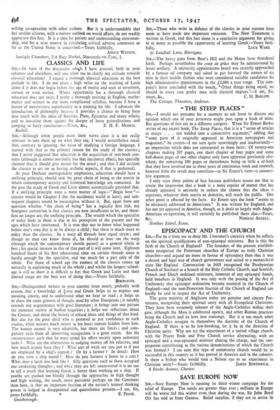EPISCOPACY AND THE CHURCH
Sta,—Far be it from me to deny Mr. Crossman's sincerity when he reflects on the spiritual qualifications of non-episcopal ministers. But is this the faith of the Church of England? The founders of the present establish- ment recognised the Protestant churches of Europe as truly Christian churches—and argued no more in 'favour of episcopacy than that it was a decent and legal way of church government and suited to a monarchical state like England. Convocation in 1603 recognised the Presbyterian Church of Scotland as a branch of the Holy Catholic Church, and Scottish, French and Dutch ordained ministers, innocent of any episcopal hands, held benefices in England. It was only with the passing of the Act of Uniformity that episcopal ordination became essential in the Church of England—and the non-Protestant fraction of the Church of England can hardly be said to respect the Act of Uniformity.
The great majority of Anglicans today are genuine and sincere Pro- testants, recognising their spiritual unity with all Evangelical Christians. They have been extremely tolerant of the Anglo-Catholics within their gate, although the Mass is celebrated openly, and other Roman practices bring the Church and its laws into contempt. But it is too much when Anglo-Catholics arrogate to themselves the doctrine of the Church of England. If there is to be law-breaking, let it be in the direction of Christian unity. Why not try the experiment of a united village church, with the Prayer Book and Free Church service alternating, with an episcopal and a non-episcopal minister sharing the charge, and the , con- gregation contributing to the various denominations of which the Church was formed ? I am sure this type of community church would be as successful in this country as it has proved in America and in the colonies. Is there a bishop who would turn a Nelson eye to an experiment in
Christian unity?—Yours faithfully, JAMES BORTHWICX. 6 Stocks Avenue, Chester.


































 Previous page
Previous page